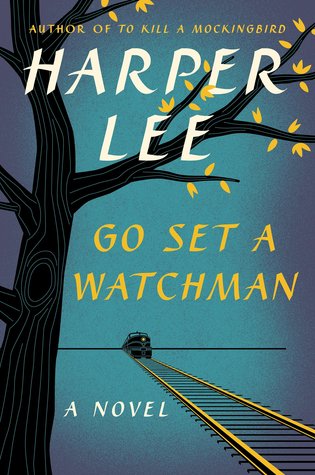Go Set a Watchman
by Harper Lee
Synopsis:

Maycomb, Alabama. Twenty-six-year-old Jean Louise Finch--"Scout"--returns home from New York City to visit her aging father, Atticus. Set against the backdrop of the civil rights tensions and political turmoil that were transforming the South, Jean Louise's homecoming turns bittersweet when she learns disturbing truths about her close-knit family, the town and the people dearest to her. Memories from her childhood flood back, and her values and assumptions are thrown into doubt. Featuring many of the iconic characters from To Kill a Mockingbird, Go Set a Watchman perfectly captures a young woman, and a world, in a painful yet necessary transition out of the illusions of the past--a journey that can be guided only by one's conscience.
My Review:
I absolutely loved it and was never disappointed as I read many of the reviewers state. This story is so well written and does not rely on what we learn about Scout and Atticus in To Kill a Mockingbird (which, by the way, I absolutely loved and will remain one of my very favorite books EVER). This story stands alone and does so brilliantly. Go Set a Watchman is about what happens to us all as we get older and we are forming our own points of views and making sense of the world around us. Jean Louise (Scout) is no longer the little girl who views the world around her through her father's lessons about right and wrong. Now, she is a young woman (mid-20s) who has left Maycomb, Alabama and experienced life away at college and then established herself as an adult in New York City. Her views have broadened, but her resolve about the treatment of people as equals (regardless of race or color) is ever stronger. She is torn between a South that is still talking about blacks as "inferior" and willing to fight the efforts of the then newly established NAACP.
One day, she finds that her father (whom she idolizes) is in attendance at a Council meeting directed at what she believes to be a rally in support of a racist agenda. Her father is likely to represent Calpurnia's (the black nanny that raised her in the absence of her own monther) grandson in a murder charge after he accidentally runs over a white man with his car. Jean-Louise starts to see that if Atticus is in support of those in the Council who want to oppose the NAACP, how could he fairly defend Cal's grandson without any racist motivations. This makes her question her own upbringing and the validity of the very lessons she felt he taught her and formed her way of thinking. She is seeing the reality of the Southern mentality first-hand, and as an adult. My favorite character in this book is Atticus' brother (Scout's uncle) who teaches Jean-Louise that to expect tolerance, one has to be tolerant of others' views even if they don't coincide with our own. Of course for the sake of keeping this review concise, I am certain I am not doing that very important interaction between Jean-Louise and her uncle the justice it deserves and the book is worth reading over and over again just for that fantastic chapter at the end of the book.
For me, Harper Lee will forever be one of the most amazing writers of my lifetime. Not just because of To Kill a Mockingbird but because of Go Set a Watchman and the real characters she brings us in Scout, Atticus, Calpurnia and even Alexandra (a true Southern woman of her time). I would ask that when you read this book, don't hold it up to To Kill a Mockingbird. I've said this before, books are like children - they may come from the same person but they are unique and should stand alone and not be compared to each other. Each has their own merits and beauty to share with the world.

No comments:
Post a Comment